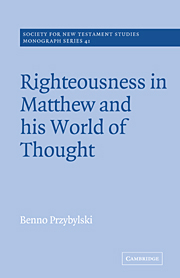Book contents
- Frontmatter
- Contents
- Preface
- Abbreviations
- 1 The problem of the meaning and significance of the Matthaean concept of righteousness
- 2 Tsedeq, tsedaqah and tsaddiq in the Dead Sea Scrolls
- 3 Tsedeq, tsedaqah and tsaddiq in the Tannaitic literature
- 4 The meaning of dikaiosynē, eleēmosynē and dikaios in the Gospel of Matthew
- 5 The relative significance of the concept of righteousness in the Gospel of Matthew
- 6 The provisional function of the Matthaean concept of righteousness
- Notes
- Bibliography and system of references
- Index of passages cited
- General index
1 - The problem of the meaning and significance of the Matthaean concept of righteousness
Published online by Cambridge University Press: 18 December 2009
- Frontmatter
- Contents
- Preface
- Abbreviations
- 1 The problem of the meaning and significance of the Matthaean concept of righteousness
- 2 Tsedeq, tsedaqah and tsaddiq in the Dead Sea Scrolls
- 3 Tsedeq, tsedaqah and tsaddiq in the Tannaitic literature
- 4 The meaning of dikaiosynē, eleēmosynē and dikaios in the Gospel of Matthew
- 5 The relative significance of the concept of righteousness in the Gospel of Matthew
- 6 The provisional function of the Matthaean concept of righteousness
- Notes
- Bibliography and system of references
- Index of passages cited
- General index
Summary
The state of the question
The controversy regarding the meaning of the Matthaean concept of righteousness has revolved primarily around the following question: Does the term ‘righteousness’ (dikaiosynē) refer to God's gift to man or God's demand upon man? This question has basically been answered in four different ways; that is, two diametrically opposed positions and two mediating views have been presented.
The positions of G. Strecker and M. J. Fiedler are representative of the diametrically opposed views. Strecker asserts that in all seven dikaiosynē-passages, righteousness refers to Rechtschaffenheit. It is always seen as a demand upon man; never as the gift of God.
Fiedler, on the other hand, claims that in all seven dikaiosynē-passages in the Gospel of Matthew, righteousness is both the eschatological gift and the demand of God. The gift, however, precedes the demand. Accordingly, Fiedler views righteousness essentially as the gift of God.
The two other views are essentially attempts at finding a mediating position between the two extreme views just expressed. These two mediating views are similar insofar as they both acknowledge that the term dikaiosynē does not have the same meaning in each occurrence. In some cases it refers to the gift of God while in others it refers to the demand made upon man. The point of contention between these two views stems from the relative importance assigned to these two aspects of righteousness.
In one mediating view greater significance is assigned to those passages in which dikaiosynē is interpreted as referring to the gift of God.
- Type
- Chapter
- Information
- Righteousness in Matthew and his World of Thought , pp. 1 - 12Publisher: Cambridge University PressPrint publication year: 1981

